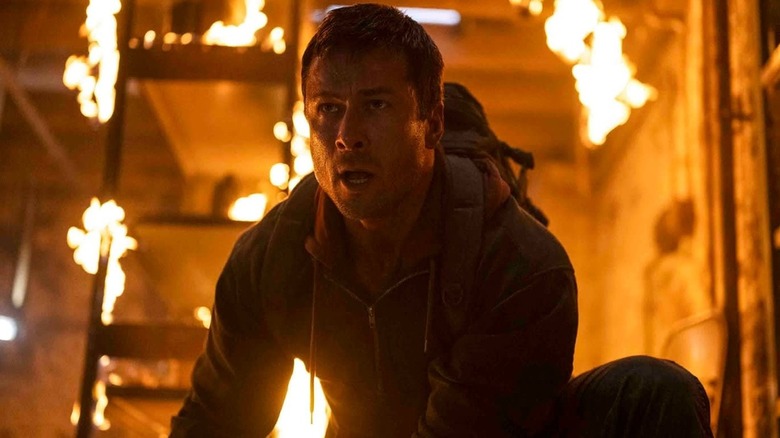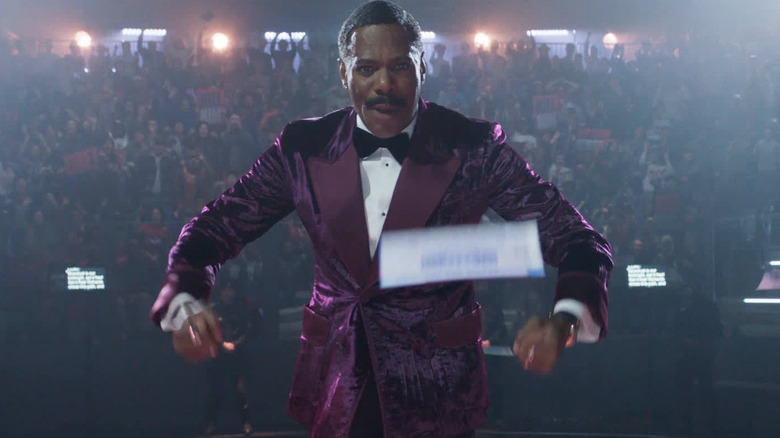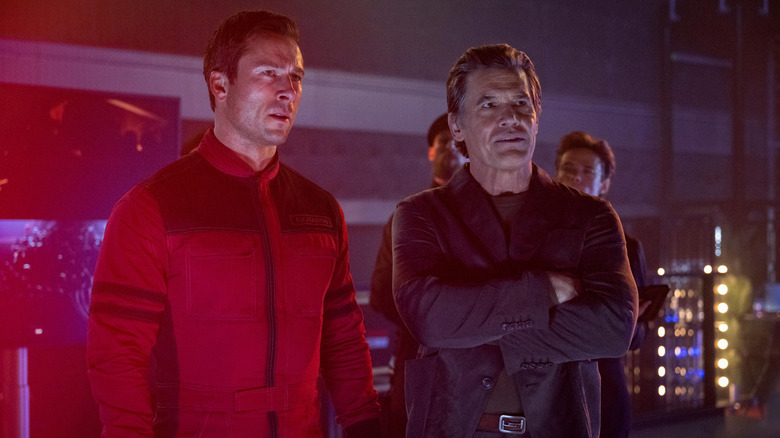5 Reasons Why Glen Powell's The Running Man Flopped At The Box Office
Despite having a lot of talent involved, Paramount's expensive "The Running Man" remake didn't connect with moviegoers in its first weekend of release. Directed by Edgar Wright ("Hot Fuzz") and starring Glen Powell ("Twisters") in the lead role, this new take on Stephen King's dystopian story of the same name is going to go down as a pretty significant box office flop.
"The Running Man" opened to $16.5 million domestically, placing at number two on the charts behind "Now You See Me: Now You Don't," which surprised with a $21 million debut. That means Wright's big-budget blockbuster failed to live up to already modest pre-release expectations, which had "The Running Man" pulling in between $19 and $28 million. Overseas audiences weren't much help, either, only adding $11.1 million to the pot and giving the film a $27.6 million global start. That's a tough way to kick things off given the movie's $110 million production budget, which doesn't account for marketing costs.
Wright's film takes place in the near future and revolves around a top-rated show where contestants must survive 30 days while being hunted by professional assassins. Katy O'Brian ("Love Lies Bleeding"), William H. Macy ("Shameless"), Lee Pace ("Foundation"), Emilia Jones ("Coda"), Michael Cera ("Superbad"), Jayme Lawson ("Sinners"), Colman Domingo ("Rustin"), and Josh Brolin ("Weapons") also star.
So, what went wrong? How did Paramount so greatly overestimate the interest in this King adaptation? We're going to look at the biggest reasons why "The Running Man" bombed at the box office on opening weekend. Let's get into it.
The Running Man was way too expensive
More than anything, "The Running Man" will go down as a major financial misfire for Paramount because it simply cost way too much money. No ifs, ands, or buts, spending $110 million on an R-rated Stephen King movie that wasn't in the realm of horror, didn't feature a proven A-list star, hailed from a director who had never made a movie this expensive before, and was set to arrive at a time when the box office is on wildly uncertain ground? That made zero sense.
It's not that a modern take on "The Running Man" wasn't worth doing, but doing it for this price was ill-advised at best. This movie would've struggled to turn a profit pre-pandemic. Now? The number of $100 million movies that succeed every year is far lower than it used to be, and, for better or worse, the types of films that can succeed at that level are limited. Audiences are very choosy about what they're willing to leave the house for. At its price tag, "Running Man" wasn't a calculated risk, it was a misguided roll of the dice.
"The Long Walk," which cost just $20 million, was an example of dystopian King made at the right price for the right audience. This, on the other hand, felt like it was specifically for American audiences yet needed a global turnout. It's an unfortunate example of a studio being too bullish about something that was, at best, a big gamble from the outset. Wright is a beloved director who's earned the right to make a big movie. Powell is very much a star on the rise who's ready to play the lead in a blockbuster. This just wasn't the right project to ensure a certain level of success.
Word of mouth for Running Man wasn't good enough
It's not that the majority of critics or filmgoers disliked "The Running Man." It's just that for a movie made at this scale, the buzz wasn't nearly good enough to turn it into a hit. A $110 million film requires casual moviegoers to get on board. The R rating also limits that audience a bit, which only adds another hurdle. In this case, the word of mouth left this in the "wait to stream" category for a large chunk of the movie's target audience.
"The Running Man" currently holds a so-so 64% critical approval rating on Rotten Tomatoes to go with a decent 79% audience rating. It also earned an okay B+ CinemaScore, which is far from great for a blockbuster. That's not to say this movie won't find an audience on VOD and streaming, but it also needs to do a certain level of business at the box office to justify its expenditures. And given how things are going at the moment, it's not going to get anywhere near what it needs.
In his review of "The Running Man" for /Film, Chris Evangelista wrote, "We've seen this stuff before — in better movies." It's a film that's certainly made for the times we live in, but that also might've been a turn off for certain viewers. At the very least, the movie's message didn't come across clearly enough to earn that must-see buzz a film like this truly needs. It failed to achieve cinematic event status.
Too much competition
Setting everything else aside, Paramount picked a tough release date for "The Running Man." It simply had too much direct competition on opening weekend, and the situation is only going to get more difficult in the coming weeks. Case in point, "Now You See Me: Now You Don't" maintained its core audience in spite of the nine-year gap between installments in the franchise (particularly overseas, where the sequel pulled in a hugely impressive $54.2 million). International audiences clearly favored magic.
A movie as big as this also needs a sizable turnout overseas. "Demon Slayer: Infinity Castle" pulled in a massive $52 million in China, which certainly didn't help this film's case in one of the largest markets in the world. Focusing again on the domestic picture, though, "Predator: Badlands" posted a bigger-than-expected $40 million opening, and it's going for the same audience as "The Running Man," more or less. It dropped 68% for a $13 million second frame domestically, but that still ate into the pie.
Looking ahead, we have "Wicked: For Good" eyeing a possible $160 million opening this upcoming weekend, with "Zootopia 2" just around the corner as well. Those movies are positioned to dominate the Thanksgiving holiday frame, which is also going to crush any chances of "The Running Man" having a decent holdover. There's little reason to think the film will rebound in the coming weeks, either. Things are likely to go from bad to worse, and hoping for long legs would be wishful rather than realistic.
Glen Powell's movie star status (currently) has its limits
Heading into this movie's release, there was a lot of buzz around Glen Powell possibly being our next big movie star. After turns in huge tentpoles such as "Top Gun: Maverick" and the unexpected $200 million hit rom-com "Anyone But You," there was a belief that he could be a leading man capable of selling tickets just because he's in the movie. That's not to suggest that Powell isn't a star, but it's clear that his star power, currently, has its limits.
Very, very few stars are capable of turning a movie into a hit simply because they're in it. Even Dwayne "The Rock" Johnson couldn't save "The Smashing Machine" from flopping just last month. But there seemed to be this hope that Powell could be a modern Tom Cruise type. He's a charming guy with a good track record. He helped make "Twisters" a $372 million hit in 2024. "Top Gun: Maverick" grossed a staggering $1.49 billion, and Powell was part of that success.
But "The Running Man" is the first time Powell has led a big movie as its central star. Timothée Chalamet is one of few younger stars who has proved that he can help turn something like this into a hit. In this case, Powell wasn't able to do the same. It's understandable that the actor wanted to be the lead in a movie of this scale and used his momentum to do so. That's part of the reason why he turned down a role in "Jurassic World Rebirth." Going forward, however, both Powell and Hollywood at large may need to re-assess just how much dollars-and-cents value he brings to a given project.
This wasn't a Stephen King remake people were begging for
Obviously, studios shouldn't cater to the whims of random fans shouting things into the void online, but the movie business is built around supply and demand, as any form of commerce is. That's also not to say that audiences always know what they want. Just look at this year's unexpected success stories like "Sinners" and "Materialists." But there is something to be said for knowing the audience. Stephen King can be a huge asset, but "The Running Man" wasn't exactly a remake that people were begging for.
The original 1987 "Running Man" starring Arnold Schwarzenegger was a bomb in its day. That's a decent reason to revisit the material, but only at a certain price point. King is also known for, above all else, horror. That's part of the reason why "It" made $700 million and became the biggest horror movie ever. That was also an example of a story that had been adapted once before, yet it was something modern audiences had a clear appetite for. Also, not for nothing, that film was made for $35 million.
Many of King's movies and TV shows go on to enjoy a long life beyond the box office. 2022's "Firestarter" was a flop but has since found new life on Netflix. Again, though, we're talking about a horror movie with a $15 million budget. From all angles, if one is going to take on King cinematically, this felt like a precarious way to go about it. At a lower price tag, "The Running Man" might've been an admirable swing and a miss. As it exists, it feels like trying to force supply to meet manufactured and/or minimal demand.
"The Running Man" is in theaters now.





